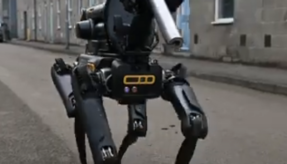
The UK Government’s Defence Science and Technology Laboratory (Dstl) has awarded Plextek the contract to lead a £2M four-year Adaptive Communications Transmission Interface (ACTI) research programme.
The programme is designed to investigate cross-layer processing for Mobile Ad-Hoc Network (MANET) architectures, thus enabling the efficient use of directional antennas and improving the quality, reliability, data rates on a range of military communications systems.
A Dstl spokesperson commented: “The ACTI research is an important programme for the Ministry of Defence. Military ad-hoc communication systems are currently limited by the range of an individual radio link and self-interference as messages are repeated through the network.”
“The ACTI research programme will explore the theory that current systems can benefit from the use of directional antennas. Over the next four years, Plextek, along with its partners, will be developing innovative MANET protocol stack and antenna technology that aims to demonstrate the benefits envisaged.”
Peter Doig, Business Manager, Defence at Plextek commented: “With this research programme we’ll be doing some pioneering work on MANET architectures that include directional, steerable antennas which have the potential to tackle some of the underlying matters that have hampered multi-hop MANET networks, with a view to enabling the next generation of military ad-hoc radios to provide an operational advantage to our military forces.”
“In teaming with our academic partners, we have the complete range of expertise to deliver the programme, including Plextek’s proven pedigree in applied research and innovation. Based on our industry-leading expertise in electronics design, antennas and propagation, we will be exploring opportunities to exploit this research programme to deliver effective technologies that improve military communications systems in the future.”
Techniques to improve connections and routing have been studied under MANET for a number of years, with no viable solution discovered through a ‘multi-hop’ approach.
However, through the use of directional antennas, the ACTI programme is designed to address these issues and cross-layer processing techniques will be developed.
If you would like to join our community and read more articles like this then please click here








